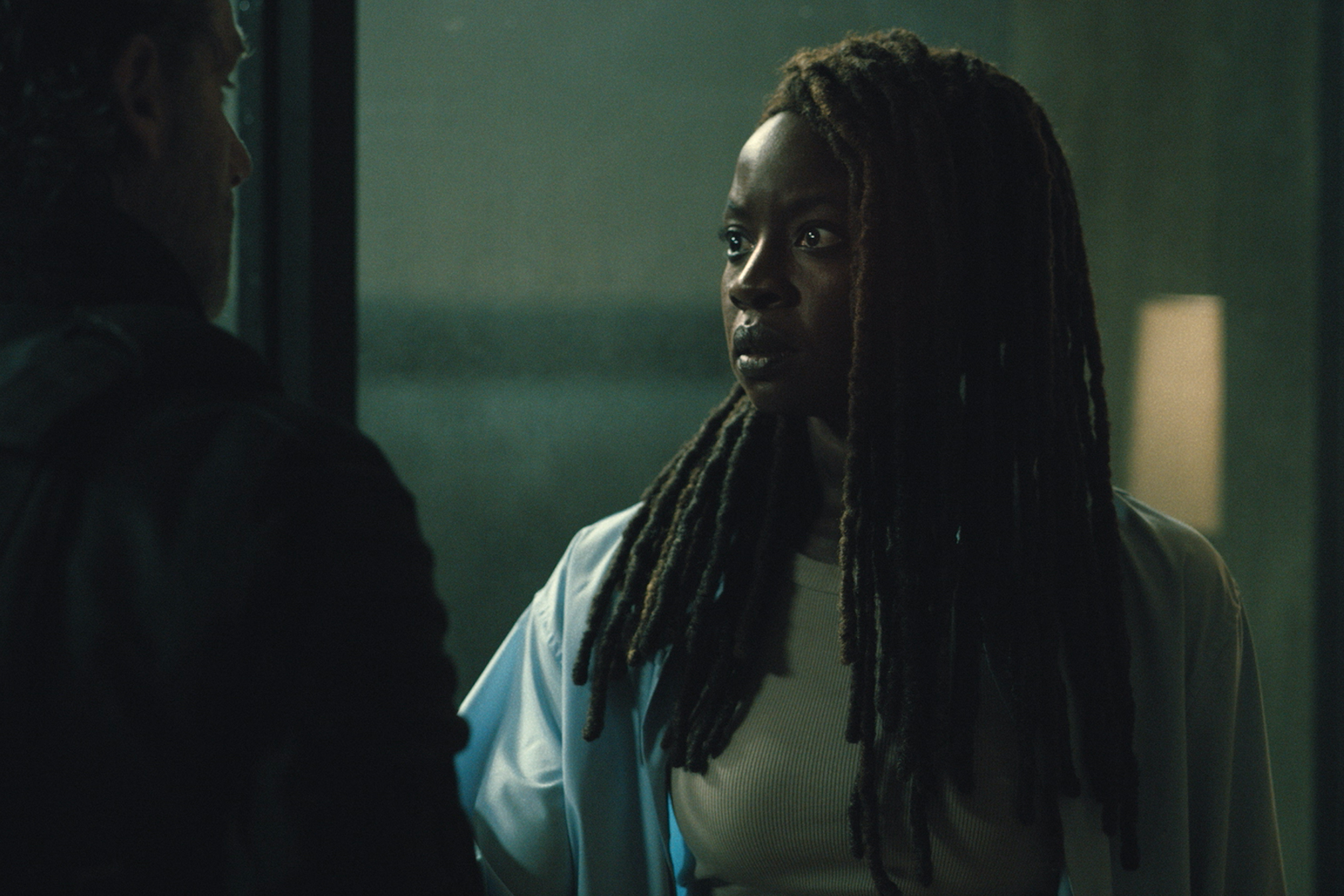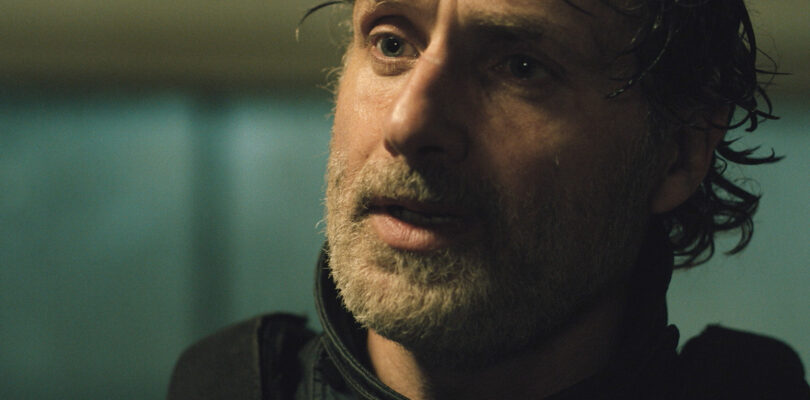[Warning: The below contains MAJOR spoilers for The Walking Dead: The Ones Who Live, Season 1, Episode 4, “What We.”]
It seems like they’ve finally figured it out. Rick Grimes (Andrew Lincoln) and Michonne (Danai Gurira) — while trapped in a failed smart community that is crumbling to the ground — couldn’t stop arguing about the best course of action after finding each other. But now it seems the lovebirds have reached a compromise and by the end of the hour, we see them peacefully driving off into the sunset. The plan? They’re sticking together, of course. (Did we really believe Rick was going to leave Michonne behind? Well, maybe.)
Gurira, who wrote the dialogue-heavy and emotional episode, weighs in on how the story’s setting came to be, overcoming Rick’s trauma and more.
Did you already have the whole series mapped out when this episode came up? At what point in the process were you when you knew that you needed this episode?
Danai Gurira: It was all mapped out. We knew exactly from the first time we were all sitting together in hotel conference rooms, we knew that this episode was going to be the two-hander where everything comes down. And then I basically said, “I want to write that one.”
So, I started writing in pre-production. Then we were in production, and I was writing while we were in production, and then things shifted and adjusted in the episode before, so that shifts what you’re writing — it’s television. [Laughs]
So you lived with this script for a while.
Oh, yeah. You have to. There’s really no way around that.
Absolutely. And this episode is exactly what the story needs at this point: for Rick and Michonne to really get back on track with each other. But what do you think makes this episode special?
It really is that moment where there’s a reckoning of the relationship. We’ve seen all the issues that have been caused for Rick in this world that he’s in, but we don’t really know the underbelly — the psychology, the real pain, the actual trauma. That’s going to really come to a head when there’s no more CRM around them. It’s really that singular moment where it’s like, “Are they going to make or break? With all that’s happened and all this time apart, can their love overcome it? Or will the wounds, pain and trauma win?” It’s an episode of the reckoning of their love, and their love wins.
And there are moments where I think, as a viewer, you don’t know if their love will win in the end, like the hallway scene. Of course, there was a logical part in the back of my mind that was saying, “Of course, they have to stay together. That’s the show!” But as I was watching that scene, that logical part was gone. And I was like, “He’d better come out into this hallway right now.”
[Laughs] That’s the goal.AMC
Absolutely. But I’m curious, where did the “smart house” setting come from? What inspired you to utilize that particular setting?
I wanted it to be a world where things were intact. There had to be folks who were deeply into green technology when things hit the fan. We haven’t really touched on them yet in that way. We touched on that a little bit in Alexandria, but that was more like a D.C.-politics thing.
But what about the folks who were hardcore innovators, who were constantly trying to figure out how to overcome the world through their innovations as green-tech people? I just built it out of that. Certain things like food are, bizarrely, one of the hardest things to keep going, especially if that’s not your field. You see that they’re trying to 3D-print food, which is not unheard of. It was happening before 2010. They were trying those things, and nothing was working to keep them going, so it became this hollow place.
It made me think there needs to be a very specific world here that [Rick and Michonne] step into and is, bizarrely, waiting for them before it completely disappears. It’s their cocoon. It’s their space, where they will come out as a butterfly or as two moths. Creating a world around them where people had tried to innovate in a way we hadn’t seen just felt like the right move.
I loved the little tech moments, like the Roomba. The fact that Michonne would know what a Roomba is, but Rick wouldn’t, was just a nice touch to their characters and who they were before.
Yeah, she would definitely have been around them, and he wouldn’t have!
I loved that. And there were obviously huge emotional moments, but one of the biggest ones that’s going to really touch fans is the nod to Rick’s son, Carl (Chandler Riggs). He was so instrumental in Rick and Michonne even getting together in the first place. Can you talk a little bit about including him in this story?
It’s that thing we call “the expected surprise,” right? What are you holding onto when you’re in this situation? Especially someone like Rick, when you know how far he went, how much he worked, how hard he worked to keep his son alive and safe, how much he loved Carl, and how, of course, [thinking of Carl is] part of how he kept himself alive during this time. Michonne was really in a place where she just thought, probably naively, that when she found [Rick], it would just be sunshine and rainbows.

AMC
She never thought she’d be dealing with these types of wounds and this type of pathology. The only time she realizes she has to take a new approach is really when they’re making love, and she sees the wound show itself in that moment where he’s truly vulnerable. She knows, “I’ve been using the wrong approach to find what’s really going on here.” It’s something that he can’t even articulate.
That sort of pain — a parent’s grief, a father like Rick Grimes’ grief — of course, is going to be one of the core things that he held onto: his son and the memory of him to feel alive. To lose that is horrifying. You start to understand more and more what has been making Rick act the way he’s been acting. How has Rick shifted? What would cause these types of wounds that would make him shift who we knew before? The loss of something like Carl’s face, Carl’s voice, Carl’s image in his mind — that. That’s going to shift Rick Grimes.
It’s heartbreaking. We also learn so much about Michonne in this episode. You’ve been developing this character for years and years and years, but do you feel like you learned more about her in writing this episode?
Yeah, definitely. These two have to go through a real process. They have to go through it in order to get to the point where you know they can be reconciled and healed. They can’t just have that. They have to go through something. That’s how we think, as storytellers, but you don’t know how far [they have to go]. How far do we stretch them?
So that’s kind of the balance. They have to be themselves, but they have to be not themselves, because of the different circumstances. So to see her, and how she expected him to be fully reconciled from minute one without any issues, there in was the thing that she now has to heal from. And it’s a clumsy adjustment. She can’t see past what she needs Rick to be for awhile. She needs him to be the old Rick, and he’s not being that guy.
He’s consistently not being that guy and that is shifting her in ways that she doesn’t like, even how she starts to behave towards him. And now something’s shifting because his love for her is not showing in the way that she needs it to. So it was about seeing her to get the point where — is she capable of just leaving him there? Of punching the lights out of him? What is the line? And feeling that through with her was a process.
The Walking Dead: The Ones Who Live, Sundays, 9/8c, AMC and streaming on AMC+
More Headlines:





